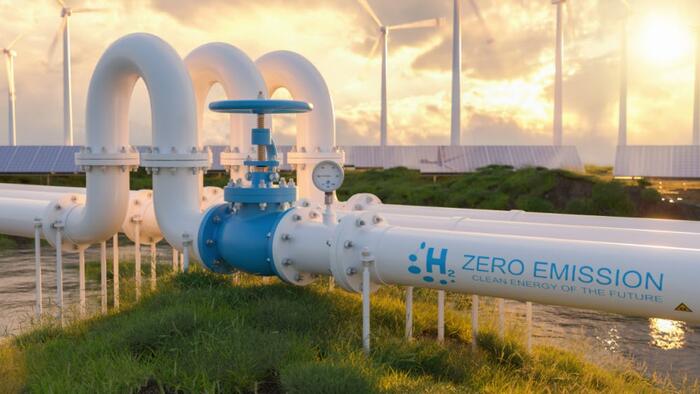Germany's Hydrogen Dream Becomes A $9 Billion Yearly Black Hole

Submitted by Thomas Kolbe
The German Federal Audit Office (Bundesrechnungshof) has dismantled the government’s hydrogen strategy. Neither on the supply side nor on the demand side do the results even remotely align with the ambitious political targets. Germany faces yet another subsidy ruin.
Berlin is in a state of hangover. The ongoing economic crisis is mercilessly exposing the delusions of the so-called green transformation. After the collapse of battery production - think of subsidy ruins like Northvolt - the retreat of industry from “green steel,” and the failure of the energy transition under the weight of wind and solar, which have become bottomless subsidy pits, the next major project is now under heavy attack: the hydrogen strategy.
Audit Office Steps Out of the ShadowsIn a recent report, the Federal Audit Office examined the German hydrogen economy - political art at its finest. Since 2020, the sector has been flooded with subsidies. For 2024 and 2025 alone, more than €7 billion in funding has been allocated. Plenty of lubricant for an engine that has been sputtering from day one and still refuses to start.
Private investors, enticed by guarantees and state-backed prices, add more than €3 billion annually. And what’s the result after five years of constant funding? Devastating. Current production of green hydrogen stands at a mere 0.16 gigawatts. Another 0.2 gigawatts are under construction.
In other words: a market that practically doesn’t exist is already consuming around €8 billion every year—public and private - like a black hole.
As always happens when the state tries to centrally steer complex sectors of the economy: hydrogen in Germany is becoming a subsidy graveyard, and taxpayers will have to pay the bill. The Audit Office politely calls it “a financial risk for the taxpayer” - but it means exactly that.
Central Planning Has Failed - AgainYes, even the Audit Office, being part of the state apparatus, follows the ideological blueprint from Brussels. And yet the verdict is surprisingly clear. The auditors ask two central questions:
One major point of criticism: the Ministry of Energy scrapped the requirement that new gas-fired power plants be built hydrogen-ready. Without that, a crucial demand stimulus is missing.
At the same time, the planned hydrogen core network is described as wildly overambitious. Supply and demand are completely out of sync.
Translation: there is no meaningful free-market demand for an overpriced eco-product.
Who could’ve guessed? Central planning has crashed and burned once more.
In conclusion, the Audit Office sees the danger of permanent state funding—with far-reaching risks for German industry and, as always, with incalculable costs for taxpayers.
In plain language: we’re witnessing the birth of another niche for green crony capitalism. An overpriced eco-product is being artificially produced even though no real market exists. Businesses are walking away, leaving behind a brutal public verdict on German energy policy: straight F.
A Remarkable RebukeThe explosive nature of this criticism lies in its source: the Federal Audit Office—an institution typically lenient toward political mismanagement. The fact that its analysis is this sharp shows the extent of the policy failure, the waste of taxpayer money, and the excess debt taken on to force political objectives.
And with rising public debt, the Audit Office will have plenty more to do. This year alone, net new borrowing—counting the so-called “special funds,” which are just rebranded debt—amounts to about 4.7% of GDP, which continues to shrink.
If the government survives, the economy remains weak, and Chancellor Friedrich Merz stays in office, Germany’s total public debt could reach around 80% of GDP by the end of the term.
Room for further green subsidy adventures is shrinking rapidly.
No Industry, No ScaleThe lack of subsidies isn’t the only problem. A major brake on hydrogen expansion is the collapse of German industry caused by the very same green transformation policies. What Brussels and Berlin didn’t account for were fleeing investments due to skyrocketing energy costs.
Scaling hydrogen production requires industrial demand—but that demand is evaporating.
Policy is stumbling from subsidy to subsidy, driven by desperation to keep previous green ruin projects alive. It’s a dreadful spectacle—for every taxpayer forced to finance it.
And business has already delivered its verdict. After ArcelorMittal walked away from a €1.3 billion subsidy to produce hydrogen-based green steel, others followed: HH2E in Thierbach, the Forsight Group, RWE—withdrawing from one of the biggest hydrogen projects in the country.
No one wants to touch this subsidy corpse, no matter how many new loans Klingbeil and friends throw at it.
* * *
About the author: Thomas Kolbe, born in 1978 in Neuss/ Germany, is a graduate economist. For over 25 years, he has worked as a journalist and media producer for clients from various industries and business associations. As a publicist, he focuses on economic processes and observes geopolitical events from the perspective of the capital markets. His publications follow a philosophy that focuses on the individual and their right to self-determination.
Loading recommendations...